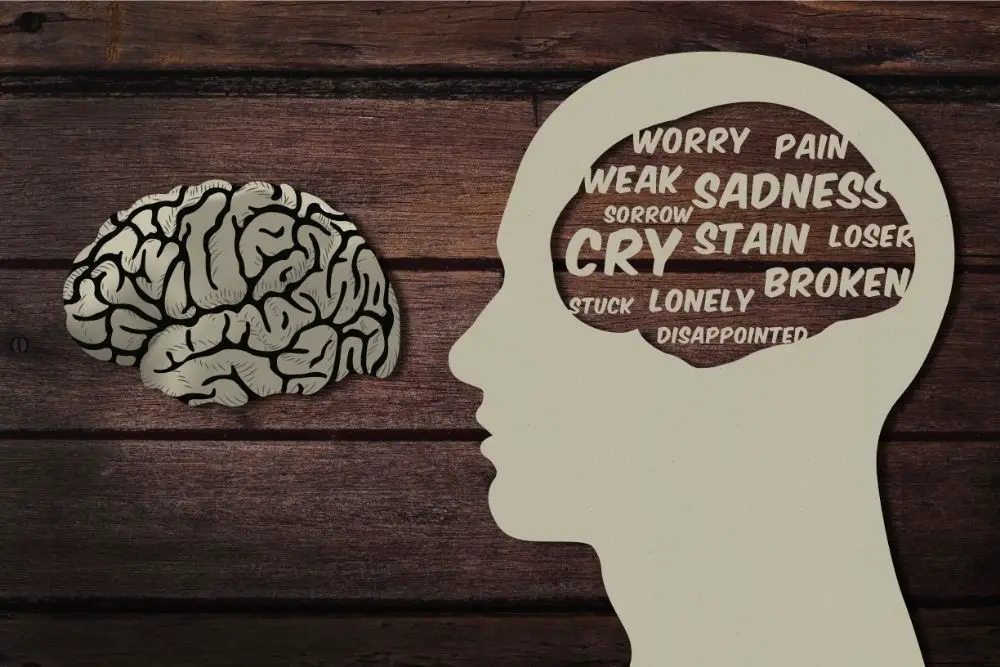We live in a world and society that is becoming ever more rife with pressures, expectations, and distractions.
Because of this, it is now harder than ever to remain focused – even happy.
We all experience stress, overthinking, and “mental noise”. Some of us deal with it better than others, but it is safe to say that a lot of us get easily overstimulated and quickly overwhelmed.

Work pressures, social media expectations, and today’s never-ending stream of notifications (news and information overload) are all things that can have a negative effect on your mental well-being.
These things can also pile up, affecting daily mood, social interactions, and quality of sleep. And this, especially, makes it more important than ever that we learn to stop the negative chatter in our heads.
Whether you experience anxiety (social, OCD, or PTSD-triggered), depression, a frenetic mind, or just want to learn to block out unwanted mental noise, now is the time to take control.
So, below are various methods that are going to help you change the way you think and feel on a daily basis.
Good Sleep And Healthy Eating
This might seem obvious, or be considered as a “general” solution, but it is worth mentioning as the first tip on this list.
Stress, even overthinking and feeling distracted, can be a direct result of poor sleep and an unhealthy diet. This is also the same for depression.
Of course, when the brain is not properly fueled or charged (through good food and sleep), it will not function at its best.
This will lead to poor cognitive function, which includes stress and an increase in negative thoughts and emotions.
With that said, if you are not getting the recommended amount of sleep each night or not eating a well-balanced, nutritious diet, you could be setting yourself up for stress, overthinking, and a negative mindset without even realizing it.
In fact, by improving your sleep and diet, the effects will work in your favor to reduce negative chatter and boost optimism.
Distract Yourself; Escape
There is nothing wrong with distracting yourself when you find yourself overwhelmed by negative mental chatter.
In fact, overthinking has a “vicious cycle” effect that feeds and aggravates itself. This makes it even more important to prevent it from happening at the very earliest stage.
The aim here is to distract yourself from overthinking. Simply put, this means making yourself busy and active.
Do you have a favorite hobby or pastime? Whether that is reading, watching movies, gaming, or listening to music, these are all incredibly effective ways to distract your mind and stop negative chatter.
In addition, these activities – activities that you enjoy – can also cause a natural chemical boost of serotonin and/or dopamine in the brain, both beneficial for initiating feelings of happiness and contentment.
Exercise
Regular exercise is one of the best things you can do for yourself – not just for physical reasons, but for healthful mental reasons, as well.
Exercise is well-known to increase blood flow (oxygen) to the brain, which will not only induce a self-esteem-boosting dopamine rush but reduce brain fog and general feelings of anxiety or inadequacy.
The next time you are feeling unfocused, overwhelmed, or overstimulated, try going for a quick run around the block.
By the time you return home, you will feel mentally refreshed and, quite surprisingly, more energized.
The long-term effects of regular exercise are also widely proven.
By incorporating exercise into your daily routine, you will find your overall levels of stress, mental noise, and low self-esteem to be greatly reduced.
Take A Walk
Taking a walk is another method for reducing negative thoughts and emotions. Even better: a walk in nature or somewhere peaceful.
With work, in particular, we all need a break to recharge our brains and reset. And taking a walk is one of the best things you can do to accomplish this.
Taking a walk or stroll has been scientifically proven to induce a mental state of calmness and gratitude while clearing the mind of any negative mental activity.
Nature, in fact, when viewed, heard, or smelled, can have a positive effect through the release of serotonin in the brain, which will make you feel happy and at peace.
If you are not doing so already, it is widely recommended to take a walk outside at least once a day.
At the least: whenever you are feeling distracted, overstimulated, or overloaded at work.

Stoicism (Acceptance)
Stoicism, the ancient Greek philosophical practice, is another method – a way of thinking, in fact – that you can adopt or at least embrace when experiencing negative chatter or a moment of hardship.
Put simply, stoicism is the philosophy of accepting things as they are.
There can be many ways to interpret this, but, essentially, it comes down to “taking the bad with the good”, or accepting the things that you do not have control over.
For example, in the event of stress or a bad situation, you may find peace by questioning whether it is in your power to resolve.
If it is, then there is no need to worry: you can resolve it. If it is not in your power to resolve, then, logistically, there is nothing to be done – so it is likewise pointless for you to worry about it.
Stoicism also teaches the impassive acceptance of the bad with the good. After all, we cannot fully appreciate happiness if we do not fully experience sadness.
And it is not always hardship that affects us directly, but the way we allow ourselves to react.
Confronting Your Fears
Sometimes, what is making us anxiously overthink is something that we should force ourselves to face.
Whether this is a social situation, a change of career, or an irrational fear, there is a good chance that you will overcome it – and the negative chatter arising from it – by confronting it head-on.
As it tends to go, the more we allow ourselves to overthink something, the scarier it grows and becomes in our heads.
But, at the same time, when we forcibly put ourselves in situations that make us uncomfortable and come out on the other side triumphant, we feel an overwhelming sense of joy, pride, and success.
This converts to confidence, and the anxiousness associated with it becomes reduced.
Oftentimes, overthinking things is what holds us back the most.
This is why it is important to learn to recognize these moments and, instead of allowing negative thoughts to overwhelm you, opt to take action without fear of “the worst” happening.
Be More Present
“Being present”, as taught by the Buddha, is something that, for many, may seem abstract, nonsensical, or purely esoteric when brought up in conversation.
However, being present, or living more presently, is more simple than it lets on.
To be present is to simply live free of past regrets and future desires. And this can help to remove feelings of anxiety, stress, and depression completely.
Too often, we view and experience the present through a “filter”, one which distorts the way we think and feel. We tend to let our past actions (fears) dictate our present decisions, as well as bank all our happiness on things we wish to happen.
Of course, if you obsess over a future promotion, or finding love, you will hinder your ability to feel happiness in the present.
To live presently, then, is to try to truly appreciate – and apply yourself to – what is happening in any given moment. While you might be excited about the destination, it is just as important to make sure to enjoy the journey.
Meditation
Last, but definitely not least, is meditation. Meditation is one of the best ways to stop the negative chatter in your head, offering a means to disconnect from your thoughts and surroundings, or even reconnect with yourself and the present.
What is meant by this?
Meditation can be a different experience for everyone: a moment of reflection and gratitude, escapism, a prayer, or a way to “connect” and feel in tune with the universe, which encompasses the present.
Ultimately, meditation can be what you need it to be. And it can be practiced by simply finding a quiet, comfortable space to sit or lie down, closing the eyes, and focusing all attention on the rise and fall of your breathing or the external sounds around you.
You might find it beneficial to imagine you are somewhere else (likening your breathing to the ebb and flow of waves, or wind), or to focus on what you are thinking or feeling.
You can accept these thoughts and emotions wholeheartedly, or envisage physically distancing yourself away from them.
As you can see, meditation is flexible and open. Either way, it is worth trying and experimenting with as a means to tune out, reflect, or reconnect with the present.
Final Thoughts
Negative chatter – whether it is coming from anxiety, stress, or overstimulation – can ultimately be prevented, or stopped altogether, by living a healthy lifestyle and learning to take control of your mind.
As listed above, this can be through acceptance and how you choose to react to negative thoughts and hardship (stoicism), confronting the source of your anxiety as a means to overcome it, or meditation.
Lastly, it is also worth remembering that all thoughts are but thoughts only. And a thought does not mean that it is true or fact. You, as the “being” that owns your mind, have the ability to choose to accept your thoughts, or even ignore them altogether.
After all, it is all just mental chatter.
